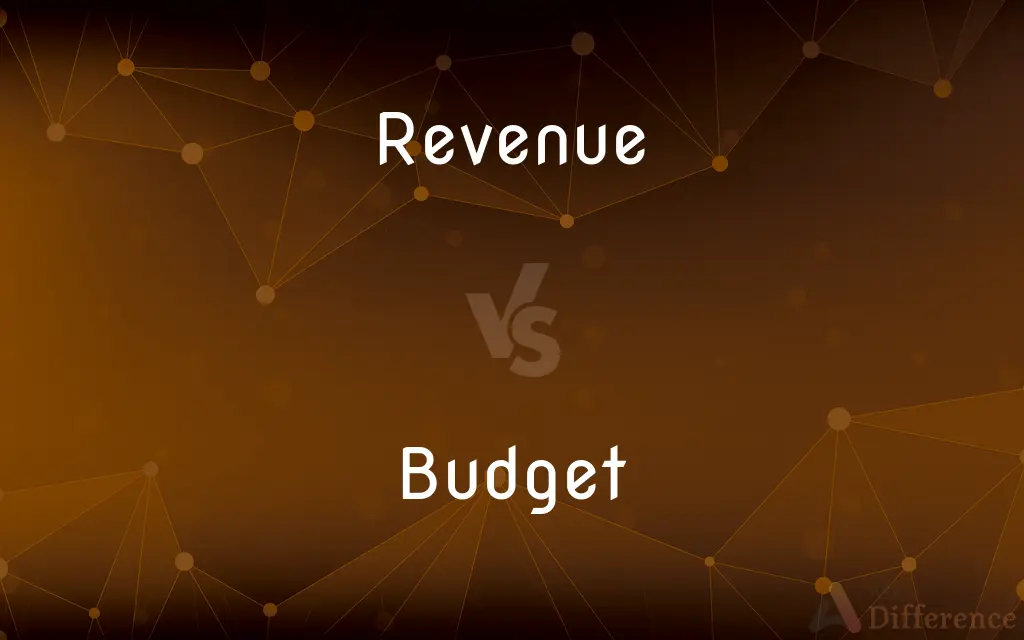Revenue vs. Budget — What's the Difference?
By Urooj Arif & Maham Liaqat — Updated on March 13, 2024
Revenue refers to the total income generated by a business from its activities, while a budget is a planned allocation of resources for future spending and saving.

Difference Between Revenue and Budget
Table of Contents
ADVERTISEMENT
Key Differences
Revenue is the total amount of money a company brings in from its business activities, such as sales of goods or services. It represents the inflow of funds that an organization receives from its operational activities. On the other hand, a budget is a financial document or plan that estimates the income and expenditures for a specific period. It serves as a roadmap for managing finances, aiming to balance revenue against expenses to achieve financial goals.
While revenue is a critical measure of a company's financial performance and growth potential, indicating the effectiveness of its sales and marketing strategies, a budget is used as a tool for financial planning and control. It helps organizations to allocate resources efficiently, manage cash flows, and ensure financial stability. Whereas revenue is realized through business operations, a budget encompasses both expected revenues and planned expenses, guiding both short-term operations and long-term strategic planning.
Revenue generation is influenced by market demand, pricing strategies, and the competitive landscape, among other factors. It is a direct reflection of a company's ability to sell its products or services. Budgeting, however, involves forecasting future financial needs and constraints, incorporating both optimistic and conservative scenarios to prepare for various outcomes. It reflects an organization's priorities, strategic goals, and operational challenges.
While revenue can fluctuate based on external market conditions and internal operational efficiencies, budgets are typically set for a fixed period, such as a fiscal year, and may be adjusted periodically to reflect changes in financial projections or strategic directions. This adjustment process allows organizations to respond to unexpected changes in revenue or expenses, ensuring financial resilience and sustainability.
Revenue and budget play complementary roles in financial management. Revenue provides a snapshot of a company's financial health and market position, whereas a budget serves as a blueprint for achieving financial discipline and strategic objectives. Both are indispensable for sound financial planning and management, but they address different aspects of an organization's financial reality.
ADVERTISEMENT
Comparison Chart
Definition
Total income generated from business activities.
A planned allocation of resources for future spending and saving.
Purpose
Measures financial performance and growth potential.
Serves as a tool for financial planning and control.
Influence Factors
Market demand, pricing strategies, competitive landscape.
Strategic goals, operational needs, financial projections.
Timeframe
Realized over a specific period (e.g., quarterly, annually).
Planned for a specific period, often adjusted based on financial performance.
Role in Management
Reflects company's ability to generate income.
Guides resource allocation and financial stability.
Compare with Definitions
Revenue
It represents the gross inflow of economic benefits.
The festival season saw a spike in the company's revenue.
Budget
Budgeting helps in setting financial goals and priorities.
The budget prioritizes research and development investments.
Revenue
It can be derived from various sources, including sales, royalties, and fees.
The software company's revenue includes license fees and subscriptions.
Budget
A budget can be used to anticipate revenue and plan for savings.
The budget forecasts a 5% increase in revenue for the next year.
Revenue
Revenue growth is a key indicator of market demand and business expansion.
Steady revenue growth signals the company's strong market position.
Budget
A budget is a financial plan for a defined period.
The annual budget outlines expected revenues and expenses.
Revenue
Revenue is the total income from sales of goods or services.
A company's revenue increased after launching a new product line.
Budget
Adjustments to the budget reflect changes in financial outlook.
Mid-year, the budget was adjusted to accommodate unexpected costs.
Revenue
Revenue is critical for assessing a company's financial health.
Analysts closely monitor quarterly revenue reports.
Budget
It serves as a blueprint for managing income and expenditures.
Managers use the budget to control departmental spending.
Revenue
In accounting, revenue is the income or increase in net assets that an entity has from its normal activities (in the case of a business, usually from the sale of goods and services to customers). Commercial revenue may also be referred to as sales or as turnover.
Budget
A budget is a financial plan for a defined period, often one year. It may also include planned sales volumes and revenues, resource quantities, costs and expenses, assets, liabilities and cash flows.
Revenue
Income, especially when of an organization and of a substantial nature
Traders have lost £10,000 in revenue since the traffic scheme was implemented
Budget
An itemized summary of estimated or intended expenditures for a given period along with proposals for financing them
Submitted the annual budget to Congress.
Revenue
The income of a government from all sources appropriated for the payment of the public expenses.
Budget
A systematic plan for the expenditure of a usually fixed resource, such as money or time, during a given period
A new car will not be part of our budget this year.
Revenue
Yield from property or investment; income.
Budget
The total sum of money allocated for a particular purpose or period of time
A project with an annual budget of five million dollars.
Revenue
All the income produced by a particular source.
Budget
A stock or collection with definite limits
"his budget of general knowledge" (William Hazlitt).
Revenue
A governmental department set up to collect public funds.
Budget
Appalachian Mountains A wallet or small pouch.
Revenue
The income returned by an investment.
Budget
To plan in advance the expenditure of
Needed help budgeting our income.
Budgeted my time wisely.
Revenue
The total income received from a given source.
Budget
To enter or account for in a budget
Forgot to budget the car payments.
Revenue
All income generated for some political entity's treasury by taxation and other means.
Budget
To make or use a budget.
Revenue
(accounting) The total sales; turnover.
Budget
Of or relating to a budget
Budget items approved by Congress.
Revenue
(accounting) The net income from normal business operations; net sales.
Budget
Appropriate for a restricted budget; inexpensive
A budget car.
Budget meals.
Revenue
(figurative) A return; something paid back.
Budget
The amount of money or resources earmarked for a particular institution, activity or timeframe.
Limited budget
Unlimited budget
Tight budget
Within the budget
Over the budget
Revenue
(intransitive) To generate revenue.
Budget
(by implication) A relatively small amount of available money.
We're on a budget, so we can't afford to eat at that restaurant.
Revenue
(transitive) To supply with revenue.
Budget
An itemized summary of intended expenditure; usually coupled with expected revenue.
Revenue
That which returns, or comes back, from an investment; the annual rents, profits, interest, or issues of any species of property, real or personal; income.
Do not anticipate your revenues and live upon air till you know what you are worth.
Budget
(obsolete) A wallet, purse or bag.
Revenue
Hence, return; reward; as, a revenue of praise.
Budget
(obsolete) A compact collection of things.
Revenue
The annual yield of taxes, excise, customs, duties, rents, etc., which a nation, state, or municipality collects and receives into the treasury for public use.
Budget
A socket in which the end of a cavalry carbine rests.
Revenue
The entire amount of income before any deductions are made
Budget
Appropriate to a restricted budget.
We flew on a budget airline.
Revenue
Government income due to taxation
Budget
(intransitive) To construct or draw up a budget.
Budgeting is even harder in times of recession
Budget
(transitive) To provide funds, allow for in a budget.
The PM’s pet projects are budgeted rather generously
Budget
(transitive) To plan for the use of in a budget.
The prestigious building project is budgeted in great detail, from warf facilities to the protocollary opening.
Budget
A bag or sack with its contents; hence, a stock or store; an accumulation; as, a budget of inventions.
Budget
The annual financial statement which the British chancellor of the exchequer makes in the House of Commons. It comprehends a general view of the finances of the country, with the proposed plan of taxation for the ensuing year. The term is sometimes applied to a similar statement in other countries.
Budget
A sum of money allocated for a particular purpose;
The laboratory runs on a budget of a million a year
Budget
A summary of intended expenditures along with proposals for how to meet them;
The president submitted the annual budget to Congress
Budget
Make a budget
Common Curiosities
What is a budget?
A budget is a detailed plan outlining expected income and expenditures over a certain period, used for financial planning and control.
Is revenue the same as profit?
No, revenue is the total income generated, while profit is the income remaining after deducting expenses.
Can a business operate without a budget?
While possible, operating without a budget risks financial instability and inefficiencies, making it challenging to achieve strategic goals.
What is revenue?
Revenue is the total income a business earns from its operations and sales of goods or services.
How often should a budget be reviewed?
Budgets should be reviewed regularly, often quarterly or annually, to adjust for financial performance and changing conditions.
How does revenue affect a budget?
Revenue projections are crucial for creating a realistic budget, as they determine the available resources for expenses and investments.
How can a budget help in managing debt?
A budget helps manage debt by allocating resources for debt repayment and avoiding unnecessary expenditures.
Can revenue be negative?
Revenue cannot be negative; it can only decrease to zero if there are no sales.
How does a budget support strategic planning?
A budget aligns financial resources with strategic goals, supporting effective planning and decision-making.
What's the difference between a fixed and a flexible budget?
A fixed budget remains unchanged regardless of changes in activity levels, while a flexible budget adjusts based on actual activity levels.
What are common sources of revenue for a business?
Common sources include product sales, service fees, subscriptions, and licensing fees.
What role does pricing strategy play in revenue generation?
Pricing strategy directly influences revenue by affecting sales volume and customer demand.
Why is budget adjustment important?
Adjusting the budget ensures that it remains relevant and reflects current financial realities and objectives.
What's the impact of expenses on revenue and budget?
Expenses reduce net income from revenue and must be carefully managed within the budget to ensure financial health and goal achievement.
How do market conditions affect revenue?
Market conditions, such as consumer demand and competition, directly impact revenue generation capabilities.
Share Your Discovery

Previous Comparison
Depressed vs. Disappointed
Next Comparison
Entice vs. LureAuthor Spotlight
Written by
Urooj ArifUrooj is a skilled content writer at Ask Difference, known for her exceptional ability to simplify complex topics into engaging and informative content. With a passion for research and a flair for clear, concise writing, she consistently delivers articles that resonate with our diverse audience.
Co-written by
Maham Liaqat













































